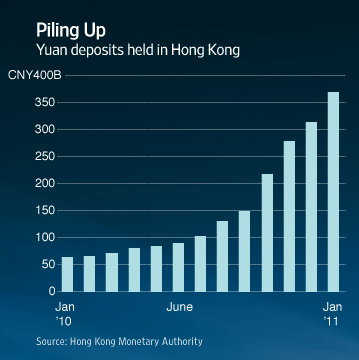HONG KONG (Dow Jones Investment Banker) – The large-scale trading simulation this week of offshore yuan-denominated securities in Hong Kong lays the groundwork for a market that could soak up the mountains of Chinese currency that cannot be repatriated easily to the mainland. It also looks very much like a dress rehearsal for Cheung Kong (Holdings) Ltd.’s long-awaited IPO and listing of a US$1 billion equivalent, yuan-denominated REIT in Hong Kong.
On March 19 and 20, the Stock Exchange of Hong Kong (HKEx) is coordinating a test of the new trading processes, enlisting some 300 brokers – about 60% of the total in Hong Kong. This exercise follows the October 2010 listing of a 10-year, CNY1.2 billion (US$182 million) bond in Hong Kong by the Asian Development Bank – the longest maturity issued so far – and involves stocks, debt securities, derivatives, ETFs and even mutual funds.
There’s little glamour or frenzy involved. It’s very much a back-office affair, as participants test order management and routing mechanisms, trading quotes and information systems, as well as credit and risk platforms.
Some background. Yuan deposits in Hong Kong continue to grow exponentially. In January, they topped CNY370 billion (US$56.4 billion), according to the Hong Kong Monetary Authority. That compares to only CNY64 billion (US$9.75 billion) a year earlier – an increase due to Beijing’s promotion of the yuan as payment for trade, as well as to its 3% to 5% annual appreciation against the US dollar.

Some of that offshore money has been invested in “dim sum” bonds – Hong Kong-listed, yuan- denominated debt securities. But their total issuance amounted to only US$5.5 billion in 2010 and even the more than US$10 billion predicted for this year is modest. Most of the yuan held in Hong Kong sits instead in deposit accounts, slowly playing the foreign exchange appreciation game. With few other places for this money to go, Beijing increasingly worries that funds repatriated to the mainland may fuel an already high 4.9% annual inflation.
Conducting CNY-denominated IPOs in Hong Kong is a sensible way to address the build-up of that currency outside the mainland, but there are concerns about liquidity. Market operators are keen to avoid a remake of China’s ill-fated B share market, the US and Hong Kong dollar-denominated Chinese equities listed in Shanghai and Shenzhen that remain very thinly traded. There simply aren’t enough active investors with sizable foreign exchange currency holdings in China for such a market to take off.
HKEx has therefore unveiled the blueprint for a facility to promote liquidity in the secondary market by making yuan available to brokers. This would assist clients interested in investing in a yuan IPO in Hong Kong but that do not have ready access to Chinese currency. This may also come in handy with retail investors in Hong Kong, who traditionally borrow heavily on margin to invest in new issues. Current regulations cap the daily exchange of Hong Kong dollars into yuan at CNY20,000 (about US$3,045). The exact mechanics of the exchange’s program are still to be ironed out, however, and will have to be vetted by the regulatory authorities.
This brings us back to Cheung Kong’s REIT.
It helps that the maiden yuan equity issue in Hong Kong will be a REIT, as yield-based instruments are likely to be held and less actively traded by many investors.
With the markets roiled by the consequences of the Japanese earthquake, tsunami and nuclear crisis, a stable instrument, paying an attractive dividend, and secured by Grade A office buildings, shopping centers and a luxury hotel, all located in Beijing, the capital of one of the world’s fastest growing countries, might just be what investors need right now. Cheung Kong’s Li Ka-shing is not dubbed “Superman” for nothing.
(Philippe Espinasse worked as an investment banker in the US, Europe and Asia for more than 19 years and now writes and works as an independent consultant in Hong Kong. Visit his website at https://www.ipo-book.com. Readers should be aware that Philippe may own securities related to companies he writes about, may act as a consultant to companies he mentions and may know individuals cited in his articles. To comment on this column, please email [email protected]).
[This article was originally published on Dow Jones Investment Banker on 18 March 2011 and is reproduced with permission. It also appeared on WSJ.com, the website of The Wall Street Journal].
Copyright (c) 2011, Dow Jones & Company, Inc.
